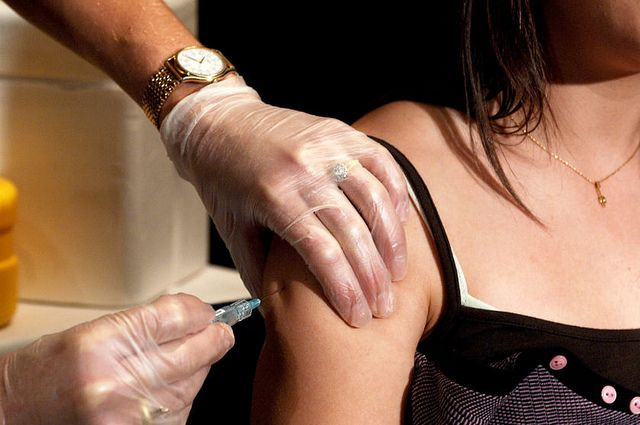HPV Vaccine Does Not Lead to Increased Sexual Activity

The fear that human papillomavirus (HPV) vaccination would lead to more promiscuous behavior in girls has been debunked in a new study.
For the study, researchers compared medical outcomes of teen girls who received the HPV shot and teen girls who were not vaccinated. Both groups had similar outcomes in regards to the number of girls that were tested for a sexually transmitted disease, sought birth control, underwent a pregnancy test or became pregnant.
The study was led by Robert Bednarczyk, from Emory University and a researcher at Kaiser Permanente. For the study, researchers from Kaiser examined up to three years of health plan data from 1,398 girls in Atlanta. Of the participants, 493 girls had the HPV shot while 905 girls did not.
The study did not focus on asking girls about their sexual activity instead, the researchers examined medical data after the girls had the HPV shot. Researchers looked for medical outcomes that signaled sexual activity. These outcomes would include seeking birth control, getting a pregnancy test, being tested for sexually transmitted diseases or becoming pregnant.
According to the researchers, based on medical outcomes, few girls engaged in sexual activity after getting a HPV shot. Nearly 90 percent of vaccinated and unvaccinated girls did not obtain birth control during the three years of the study nor did they get a pregnancy test or were tested for sexually transmitted diseases. Two girls in the vaccinated group and two girls in the unvaccinated group became pregnant during the time of the study.
"We saw no increase in pregnancies, sexually transmitted infections or birth-control counseling - all of which suggest the HPV vaccine does not have an impact on increased sexual activity," said Dr. Bednarczyk in a statement.
HPV vaccination has been causing parents to be concerned that this form of protection could lead to teenage girls engaging in sex. Gardasil, the HPV vaccine, was approved in 2010 but was slow to catch on, according to Kaiser. The reason was due to concerns, from parents, media and peer-reviewed articles, that teens may believe that Gardasil does more than protect against HPV which would lead to increased sexual activity because teens would think they were safe from all diseases and that Gardasil will protect against pregnancy.
The Centers for Disease Control and Prevention has recommended HPV vaccinations for both boys and girls starting at the age of 11. The shot is important because HPV is the leading cause of cervical cancer and HPV is the most common sexually transmitted disease.
The HPV vaccination has been recommended in order to reduce the spread of the disease and reduce the number of cervical cancer cases linked to HPV. The vaccine is effective in reducing the spread of HPV but that has not eased worries of parents that the vaccine would lead to more teens engaging in sex.
The latest study builds off a previous study by the CDC that used self-reporting of girls between the ages of 15 and 24 and determined that HPV shots did not lead to sexual activity. Self-reporting may be unreliable for a variety of reasons and that's why researchers believe this latest study using medical outcomes should ease any concerns.
"This is reassuring news for teenagers, parents and members of the public. Our study adds to growing evidence that the HPV vaccine is a safe and effective way to prevent these rare but sometimes deadly cancers," said co-author Robert Davis, MD, MPH, a senior investigator at Kaiser.
The study was published in Pediatrics.
Published by Medicaldaily.com



























